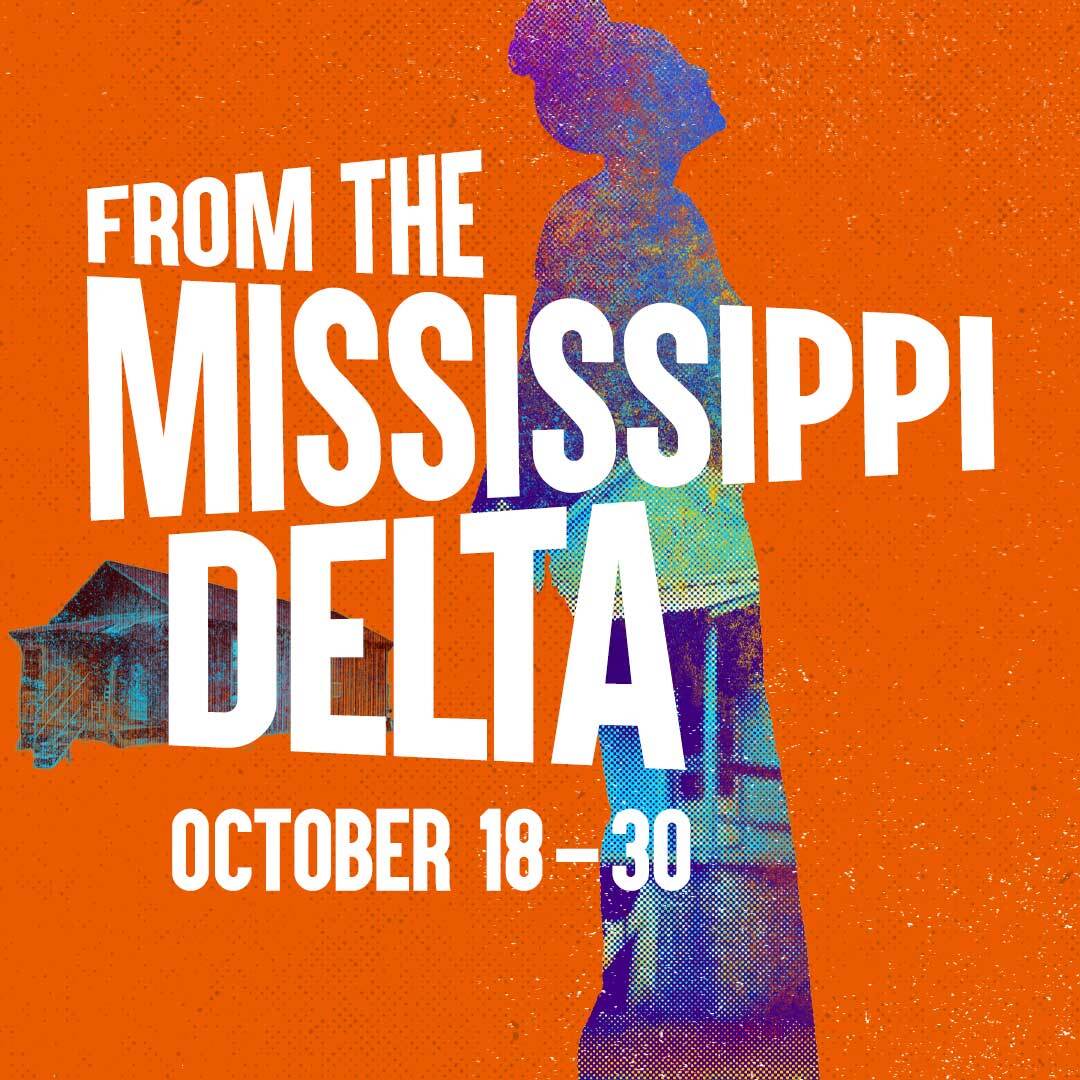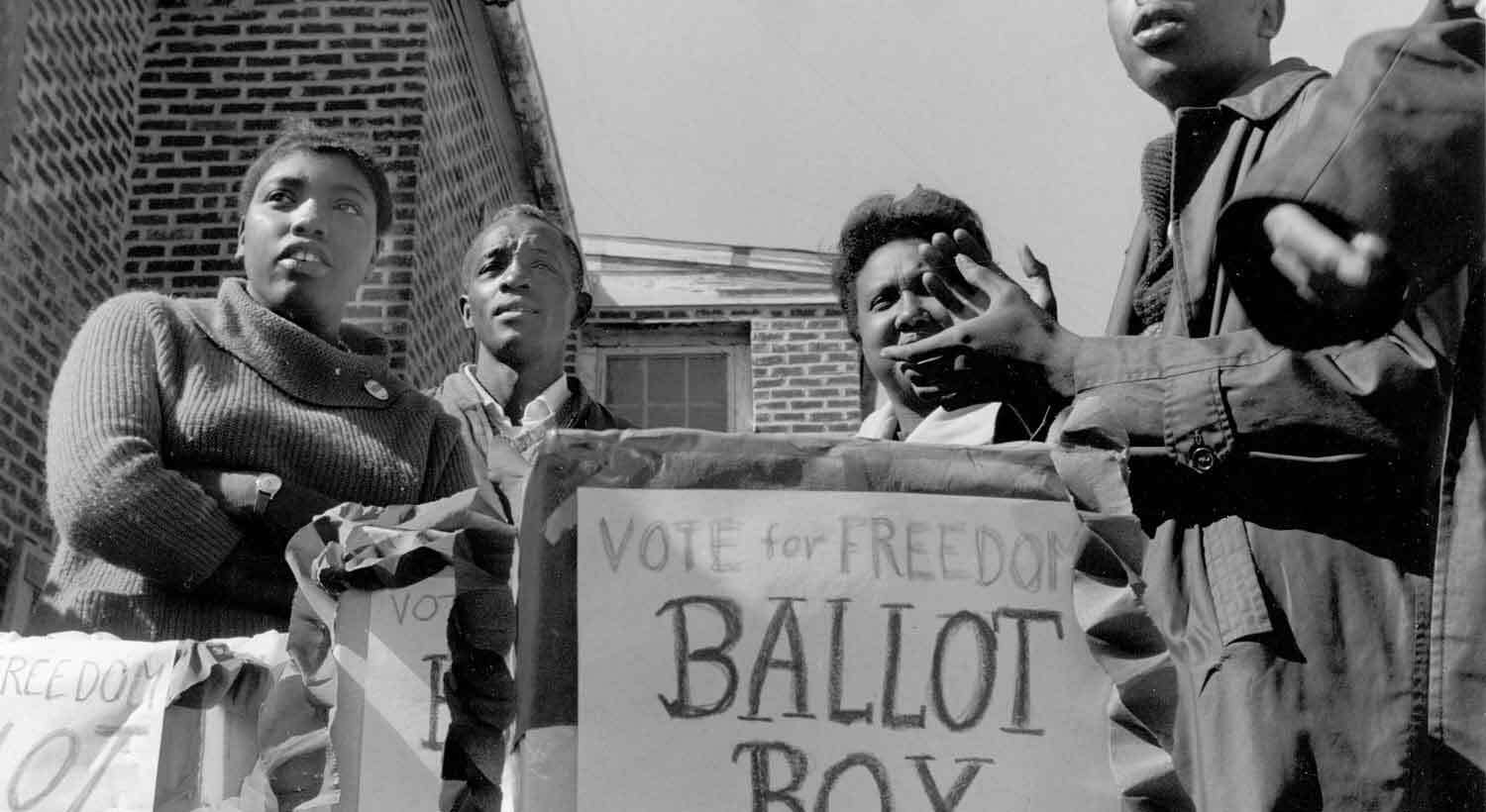
by DR. ENDESHA IDA MAE HOLLAND
directed by GOLDIE E. PATRICK
CAST
WOMAN ONE
Claudia Logan*
WOMAN TWO
Tameishia Peterson*
WOMAN THREE
Erin Margaret Pettigrew*
CREATIVE TEAM
SCENIC DESIGN
Jason Ardizzone-West
COSTUME DESIGN
Heidi Hanson
LIGHTING DESIGN
John D. Alexander
COMPOSER / MUSIC DIRECTOR
Michael Keck
DIALECT COACH
Dawn-Elin Fraser
INTIMACY COACH
Ann C. James
WIG DESIGN
Nikiya Mathis
PROPS SUPERVISOR
Sean Sanford
PRODUCTION STAGE MANAGER
Melissa Sparks*
ASSISTANT STAGE MANAGER
Tré Wheeler*
CASTING
Tara Rubin Casting, CSA
Claire Burke, CSA
*Member of Actors’ Equity Association
RUNNING TIME
~120 minutes, including a 15 minute intermission
Produced by special arrangement with
DRAMATIC PUBLISHING, Woodstock, Illinois
Greetings Westport Country Playhouse,
I have the humbling honor of serving as director of this production of From The Mississippi Delta. I am Goldie Estelle Patrick, a self-proclaimed future folklorist of Blackness, largely Black women and girls. A purveyor of story and truth. A carrier, conductor and conjurer of story. A cultural worker who uses theatre as my tool for healing and transformation.
I am named for the women before me, my grandmother, Goldie who was named after her grandmother, Goldie “Big Ma”. And my great grandmother, Estelle. My great grandmother and great great grandmother were women born and raised in Alabama; Southern Black women with passions and dreams of photography and education, who worked ironing and washing clothes for a living. Their daughter, my grandmother–Goldie for who I am also the namesake for, has devoted her life to education.
These women were brilliant. As are the women in From the Mississippi Delta. As was Dr. Endesha Ida Mae Holland. And that is why I said “yes” to telling this story. As Andre 3000 says, “The south has something to say” and it's imperative that we hear them. This play is a testament to the bold black women born out of the south. A proclamation about the revolutionary petunias like Dr. Holland who were planted in the rich soil and rose From the Mississippi Delta.
This is a play born out of the life and experiences of Mississippi native, Dr. Endesha Ida Mae Holland. She tells the story of how she blossomed as a woman in Greenwood, Mississippi and from that was able to go on and impact the world wherever she went. So I ask you:
Where were you planted?
Where did you grow — blossom?
Who…what watered you in your becoming?
We frequently use “watering” to describe and bring to life the growing of something or someone. Why? Because we understand and respect how crucial water is to life. That is why we are asking our community of audiences to stand for and stand up in support of those in Jackson, Mississippi who are currently without a necessary life force — water.
This is a call to action for us all. Your contribution to the communities in Jackson Mississippi without clean water is a testament to your commitment and allegiance to what Dr. Endesha Ida Mae Holland stood for: justice and freedom. Please donate now and consider donating regularly to those directly affected and impacted by the Jackson, Mississippi water crisis.
Donate to Mississippi Rising Coalition »
Stay up to date on work on the ground through the Community Foundation for Mississippi.
Thank you,
Goldie Estelle Patrick
Dr. Endesha Ida Mae Holland
(August 29, 1944 – January 25, 2006)

The following text is from a piece on Dr. Holland by Dr. Habibi Minnie Wilson. It was written in 2005, prior to Dr. Holland’s death in 2006.
When Ida Mae Holland entered the world on August 29, 1944, in Greenwood, Miss., no one could have predicted the odyssey that would become her life. “Cat,” as she was nicknamed, was born in a rundown, drafty shotgun house to a poor but resourceful black woman, who already had three hungry mouths to feed, no formal education and limited employment choices. Curious, smart and precocious, young Ida learned from her mother, Ida Mae–familiarly known as Aint Baby–how to dream big dreams, for herself and others, in their impoverished Delta community. During the 1940s and 1950s, Greenwood was a place where black people lived in fear of their lives-and rightfully so, as lynchings, rapes, firebombings and a range of unimaginably gruesome atrocities were commonplace.
Raped by a white man on her 11th birthday, expelled from school, a prostitute at 12 and a mother at 15, Holland was headed in the wrong direction; that is, until the civil rights movement came to her town. She was swept into the momentum, participating in sit-ins, mass rallies, even going to jail with other activists, and her life was transformed. “From that moment on I said I could be somebody,” she writes in her memoir. In retaliation for her daughter’s activism, Aint Baby’s home was firebombed by members of the Klan and she was killed. Devastated but determined, Holland earned her GED, and in 1966 she moved north to Minneapolis. Soon afterward, she added “Endesha” to her name-which is Swahili for “one who drives herself and others forward.”
Subsequently, Holland earned her bachelor’s and master’s degrees as well as a doctorate from the University of Minnesota in American studies, with a concentration in theatre arts (playwriting). The first of her plays, The Second Doctor Lady, is about her mother, whose skill and competency earned her the title, and it won the Lorraine Hansberry Award for Best Play in 1981.
From the Mississippi Delta, her sixth play and part of a trilogy, has earned critical acclaim and has been nationally and internationally celebrated as an inspiring dramatic portrayal of the human experience, as viewed through the eyes of an African-American woman. (Holland’s memoir, also entitled From the Mississippi Delta, was originally published by Simon & Schuster and is available in hardcover and paperback in bookstores.)
Dr. Endesha, as she is called by her students, is now a retired professor emeritus from the University of Southern California, where she held joint appointments both in the School of Theatre and the program of the Study of Women and Men in Society (SWMS) from 1993 to 2003. Forced into early retirement and a wheelchair by ataxia, a hereditary, neuromuscular disorder, Holland now resides in Marina del Rey, Calif., and hopes that her legacy to her students and audiences around the world is one of determination, hope, motivation and inspiration. She holds herself up to the light as a constant reminder that anyone can make it, anyone can survive … anyone can be somebody.
– Dr. Habibi Minnie Wilson, Los Angeles, Calif., 2005
Associate Producer / Director of Production
David Dreyfoos
Technical Director / Associate Director of Production
RJ Romeo
Company Managers
Bruce Miller
Max Hunt
Head Shop Carpenter
Jason Thompson
Shop Carpenter
Scott A. Trichka
Head Sound
Jon Damast
Head Electrician
Charlestone Gourdet
Scenic Artist
Nick Schons
Wardrobe Supervisor
Jessica Camarero
Charles Chauca
Associate Wig Designer
Tinika Sadiku
Assistant Scenic Designer
Teresa L. Williams
Assistant Lighting Designer
Dominic DeSalvio

This Theatre operates under an agreement between the League of Resident Theatres and Actors’ Equity Association, the Union of Professional Actors and Stage Managers in the United States.
![]()
The Director is a member of the Society of Stage Directors and Choreographers, Inc., an independent national labor union.

Westport Country Playhouse employs members of the International Alliance of Theatrical Stage Employees, Local 74.

The scenic, costume, lighting and sound designers in LORT Theatres are represented by United Scenic Artists, Local USA-829 of the IATSE.











